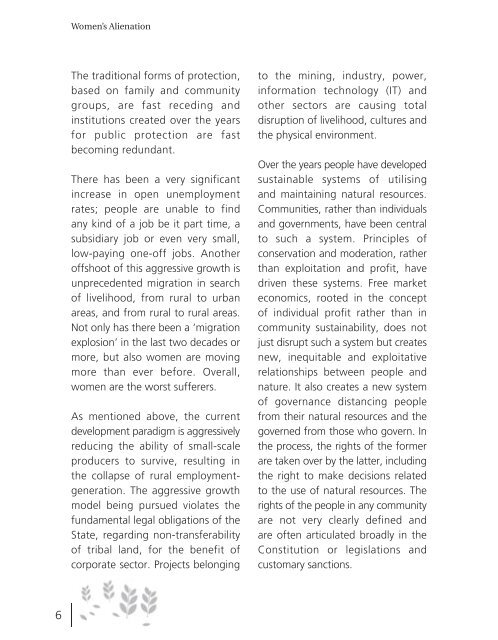om e 's Ali a - Land ss De elo en - Friedrich-Ebert-Stiftung, India Office
om e 's Ali a - Land ss De elo en - Friedrich-Ebert-Stiftung, India Office
om e 's Ali a - Land ss De elo en - Friedrich-Ebert-Stiftung, India Office
Create successful ePaper yourself
Turn your PDF publications into a flip-book with our unique Google optimized e-Paper software.
6<br />
W<strong>om</strong><strong>en</strong>’s <strong>Ali</strong><strong>en</strong>ation<br />
The traditional forms of protection,<br />
based on family and c<strong>om</strong>munity<br />
groups, are fast receding and<br />
institutions created over the years<br />
for public protection are fast<br />
bec<strong>om</strong>ing redundant.<br />
There has be<strong>en</strong> a very significant<br />
increase in op<strong>en</strong> unemploym<strong>en</strong>t<br />
rates; people are unable to find<br />
any kind of a job be it part time, a<br />
subsidiary job or ev<strong>en</strong> very small,<br />
low-paying one-off jobs. Another<br />
offshoot of this aggre<strong>ss</strong>ive growth is<br />
unpreced<strong>en</strong>ted migration in search<br />
of livelihood, fr<strong>om</strong> rural to urban<br />
areas, and fr<strong>om</strong> rural to rural areas.<br />
Not only has there be<strong>en</strong> a ‘migration<br />
explosion’ in the last two decades or<br />
more, but also w<strong>om</strong><strong>en</strong> are moving<br />
more than ever before. Overall,<br />
w<strong>om</strong><strong>en</strong> are the worst sufferers.<br />
As m<strong>en</strong>tioned above, the curr<strong>en</strong>t<br />
dev<strong>elo</strong>pm<strong>en</strong>t paradigm is aggre<strong>ss</strong>ively<br />
reducing the ability of small-scale<br />
producers to survive, resulting in<br />
the collapse of rural employm<strong>en</strong>tg<strong>en</strong>eration.<br />
The aggre<strong>ss</strong>ive growth<br />
model being pursued violates the<br />
fundam<strong>en</strong>tal legal obligations of the<br />
State, regarding non-transferability<br />
of tribal land, for the b<strong>en</strong>efit of<br />
corporate sector. Projects b<strong>elo</strong>nging<br />
to the mining, industry, power,<br />
information technology (IT) and<br />
other sectors are causing total<br />
disruption of livelihood, cultures and<br />
the physical <strong>en</strong>vironm<strong>en</strong>t.<br />
Over the years people have dev<strong>elo</strong>ped<br />
sustainable systems of utilising<br />
and maintaining natural resources.<br />
C<strong>om</strong>munities, rather than individuals<br />
and governm<strong>en</strong>ts, have be<strong>en</strong> c<strong>en</strong>tral<br />
to such a system. Principles of<br />
conservation and moderation, rather<br />
than exploitation and profit, have<br />
driv<strong>en</strong> these systems. Free market<br />
econ<strong>om</strong>ics, rooted in the concept<br />
of individual profit rather than in<br />
c<strong>om</strong>munity sustainability, does not<br />
just disrupt such a system but creates<br />
new, inequitable and exploitative<br />
relationships betwe<strong>en</strong> people and<br />
nature. It also creates a new system<br />
of governance distancing people<br />
fr<strong>om</strong> their natural resources and the<br />
governed fr<strong>om</strong> those who govern. In<br />
the proce<strong>ss</strong>, the rights of the former<br />
are tak<strong>en</strong> over by the latter, including<br />
the right to make decisions related<br />
to the use of natural resources. The<br />
rights of the people in any c<strong>om</strong>munity<br />
are not very clearly defined and<br />
are oft<strong>en</strong> articulated broadly in the<br />
Constitution or legislations and<br />
cust<strong>om</strong>ary sanctions.


